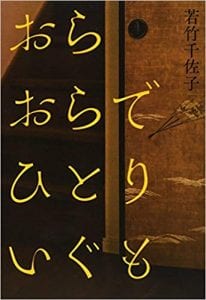Wakatake Chisako 若竹千佐子. Oraora de hitori igu mo おらおらでひとりいぐも. Kawade, 2017.
This shared the 158th A-Prize, for late 2017.
Wakatake was a 63 year old first-timer when she won the prize, which automatically makes one think of Kuroda Natsuko, who won with ab sango in 2012: the cynical read is that this is another attempt to encourage Japan’s ever-increasing population of elderly people. Slightly less cynically, to recognize that an increasingly percentage of readers, and probably more so of literary fiction than other kinds, is old. Even more than ab sango (which truthfully nobody knew quite what to make of), this is being positioned as capturing the voice of Japan’s aging population. The catch copy on the obi calls it a gentō shōsetsu 玄冬小説, a “black winter” novel, the opposite of a seishun shōsetsu 青春小説 (youth novel, but literally of course “green spring” novel). They’re trying to make it a thing.
The story is told in the third person, but confines itself entirely to the point of view of Momoko-san, a woman in her early 70s. Momoko-san was widowed about fifteen years ago, and is more or less estranged from her two children, who more or less seem to visit or call when they need something. Momoko-san seems to be living in Tokyo as the story opens, because a lot of it comprises her reflections about being a displaced Tōhoku person (the author is from Tōno). She’s displaced because as a young woman, three days before her wedding, she fled her native village to go to Tokyo – on the eve of the ’64 Olympics – because she just had to get out. Restless. But ended up feeling alienated by her own accent, and not fitting in well in Tokyo, and marrying a fellow displaced Tōhoku person. Who died relatively young.
It’s a stream-of-consciousness book. Very stream-of-consciousness; little in the way of plot, although part does concern a long hike to her late husband’s grave, and there’s some interaction with her daughter and granddaughter. There’s a fair amount of recollection, but not as much as one would have expected; we get glimpses of her life in Tōhoku, glimpses of her marriage, but seldom enough to detail to make it really come alive. The orderly presentation of memory is intentionally disrupted by the decision to make Momoko-san someone who seem to be getting scattered as she ages; the novel begins with the description of a cacaphony of voices in her head, and there’s the suggestion throughout that she might be slipping into Alzheimer’s, perhaps.
The voices speak to her in Tōhoku dialect, and so much of the internal monologue that comprises the book is in that language. Some of the most interesting parts of the story deal with Momoko-san’s reflections on how she intentionally left her dialect behind, but then found herself unable to deal with key concepts in standard Japanese. “I,” for example: she grew up in a regime where males and females both called themselves ora, and feels uneasy locking herself into the feminine standard watashi.
This book is getting a tremendous reception in Japan. The committee members, and a lot of readers both famous (and quoted on the obi) and not (just google it), seem to be charmed by the humor and unprepossessing honesty of the narrative. It really seems to be making an impact.
I have to admit that I didn’t get the humor at all. It all seemed very dark and oppressive to me. Not the dialect, which you get used to (but which has been handled much better in some other recent A-Prize works). But the solitude and estrangement and sense of a wasted life with no joy in the present or hope for the future. Maybe some of the details just hit too close to home (as I deal with an aging parent), or maybe I just didn’t comprehend it well enough. Anyway, this one didn’t do anything for me. I hope that’s not happening as often lately as it seems like it might be…
Edit, March 2019:
After teaching part of this I realized I was a little harsh in my initial assessement of it. Above I refer to the way it evokes questions about dialect, language, and identity through its deft code-switching between dialect and standard Japanese, internal monologue and omniscient narration. On rereading it I found this aspect of the book quite powerful. These are important questions, and I’m not sure I’ve read them expressed quite this powerfully before.
